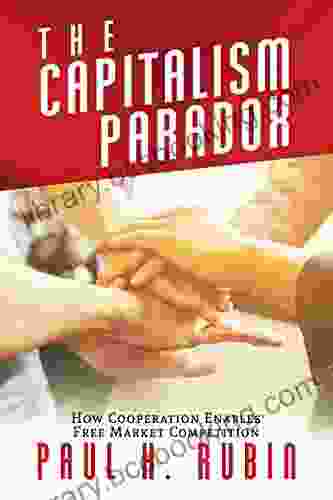Cooperation: The Catalyst for Free Market Competition

In the realm of economics, competition is often heralded as the driving force behind innovation, efficiency, and market prosperity. However, a lesser-known but equally vital factor has the power to amplify the benefits of competition and create a more robust and equitable market landscape: cooperation.
This article will explore the transformative impact of cooperation on free market competition, showcasing how collaboration can fuel innovation, enhance efficiency, and foster a more vibrant and dynamic market environment.
4.5 out of 5
| Language | : | English |
| File size | : | 2487 KB |
| Text-to-Speech | : | Enabled |
| Screen Reader | : | Supported |
| Enhanced typesetting | : | Enabled |
| Word Wise | : | Enabled |
| Print length | : | 194 pages |
| Lending | : | Enabled |
Cooperation: A Catalyst for Innovation
Competition often sparks innovation as businesses strive to gain an edge over their rivals. However, cooperation can provide an even more fertile ground for groundbreaking ideas.
When businesses collaborate, they can pool their resources, expertise, and perspectives to tackle complex problems that individual entities might struggle with. This collaborative approach allows for a wider range of ideas, more diverse perspectives, and a greater willingness to experiment.
History is replete with examples of how cooperation has spurred innovation. The development of the internet, for instance, was a collaborative effort involving researchers, engineers, and businesses from around the world. Similarly, the Human Genome Project, a groundbreaking scientific endeavor to decipher the complete DNA sequence of humans, was made possible through extensive cooperation among scientists from various institutions.
Cooperation: A Path to Enhanced Efficiency
Competition can incentivize businesses to optimize their operations to reduce costs and improve efficiency. However, cooperation can complement this competitive drive by enabling businesses to share resources, knowledge, and best practices.
Through collaboration, businesses can identify and eliminate redundancies in their operations, streamline processes, and leverage economies of scale. This coordinated approach can lead to significant cost savings, improved productivity, and enhanced competitiveness for all participating entities.
Consider the example of the automotive industry, where cooperation has played a pivotal role in improving efficiency and reducing costs. Automakers have formed alliances to share研发platforms, production facilities, and distribution networks. This collaborative approach has enabled them to spread the fixed costs of development and manufacturing across a larger volume of vehicles, resulting in lower production costs and more affordable cars for consumers.
Cooperation: A Catalyst for Market Vitality
In a competitive market, businesses often prioritize short-term gains over long-term sustainability. This can lead to a narrow focus on maximizing profits at the expense of broader market health.
Cooperation, on the other hand, encourages businesses to adopt a more holistic view of the market and recognize the interdependencies between different players. By working together, businesses can establish industry standards, promote responsible business practices, and foster a sense of shared responsibility.
This collaborative approach creates a more stable and predictable market environment, which encourages investment, innovation, and long-term growth. As businesses recognize the benefits of cooperation, they become more inclined to invest in initiatives that promote overall market vitality, such as workforce development, environmental sustainability, and consumer protection.
Cooperation is not a substitute for competition in free markets. Instead, it is a complementary force that amplifies the benefits of competition and creates a more robust, innovative, and equitable market landscape.
By embracing cooperation, businesses, policymakers, and consumers can unleash the full potential of free market competition and build an economic ecosystem that benefits all. As the adage goes, "a rising tide lifts all boats." In the context of free markets, cooperation is the tide that lifts the boats of businesses and consumers alike, leading to a more prosperous and fulfilling economic environment.
4.5 out of 5
| Language | : | English |
| File size | : | 2487 KB |
| Text-to-Speech | : | Enabled |
| Screen Reader | : | Supported |
| Enhanced typesetting | : | Enabled |
| Word Wise | : | Enabled |
| Print length | : | 194 pages |
| Lending | : | Enabled |
Do you want to contribute by writing guest posts on this blog?
Please contact us and send us a resume of previous articles that you have written.
 Book
Book Novel
Novel Page
Page Chapter
Chapter Text
Text Story
Story Genre
Genre Reader
Reader Library
Library Paperback
Paperback E-book
E-book Magazine
Magazine Newspaper
Newspaper Paragraph
Paragraph Sentence
Sentence Bookmark
Bookmark Shelf
Shelf Glossary
Glossary Bibliography
Bibliography Foreword
Foreword Preface
Preface Synopsis
Synopsis Annotation
Annotation Footnote
Footnote Manuscript
Manuscript Scroll
Scroll Codex
Codex Tome
Tome Bestseller
Bestseller Classics
Classics Library card
Library card Narrative
Narrative Biography
Biography Autobiography
Autobiography Memoir
Memoir Reference
Reference Encyclopedia
Encyclopedia Robert B Cialdini
Robert B Cialdini Michael J Howell
Michael J Howell Lewis Kirkham
Lewis Kirkham Sylvie Bigar
Sylvie Bigar Ryan Higa
Ryan Higa Xavier P Hunter
Xavier P Hunter Michael Betancourt
Michael Betancourt Richard Maury
Richard Maury Natalie N Hooks
Natalie N Hooks Malena Watrous
Malena Watrous Tedd Tripp
Tedd Tripp Michael Hingson
Michael Hingson Oscar Wegner
Oscar Wegner Lisa Lowe
Lisa Lowe Russell Bryant
Russell Bryant Steven Alan Childress
Steven Alan Childress Roddy Scheer
Roddy Scheer Waka T Brown
Waka T Brown Peter Dickinson
Peter Dickinson R R Palmer
R R Palmer
Light bulbAdvertise smarter! Our strategic ad space ensures maximum exposure. Reserve your spot today!
 Ervin BellFollow ·2.9k
Ervin BellFollow ·2.9k Ralph Waldo EmersonFollow ·17.7k
Ralph Waldo EmersonFollow ·17.7k Gary CoxFollow ·19.2k
Gary CoxFollow ·19.2k Ricky BellFollow ·14.3k
Ricky BellFollow ·14.3k Samuel WardFollow ·17.8k
Samuel WardFollow ·17.8k Langston HughesFollow ·10.4k
Langston HughesFollow ·10.4k Randy HayesFollow ·15k
Randy HayesFollow ·15k Morris CarterFollow ·11.1k
Morris CarterFollow ·11.1k

 Brian Bell
Brian BellExploring The Natural World Through Mindful Expressive...
Unleash the...

 David Baldacci
David BaldacciJourney into the Enigmatic World of "Grass" by Sheri S....
Prepare to be captivated by "Grass," a...

 Dashawn Hayes
Dashawn HayesBusting Myths About Human Nature: Unraveling the Complex...
Challenging the...

 Ernest Hemingway
Ernest HemingwayNotes on Suicide: A Profound Exploration of the...
Suicide, a taboo subject shrouded in...
4.5 out of 5
| Language | : | English |
| File size | : | 2487 KB |
| Text-to-Speech | : | Enabled |
| Screen Reader | : | Supported |
| Enhanced typesetting | : | Enabled |
| Word Wise | : | Enabled |
| Print length | : | 194 pages |
| Lending | : | Enabled |
















